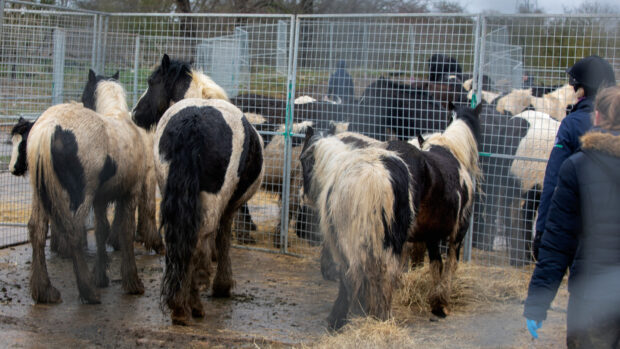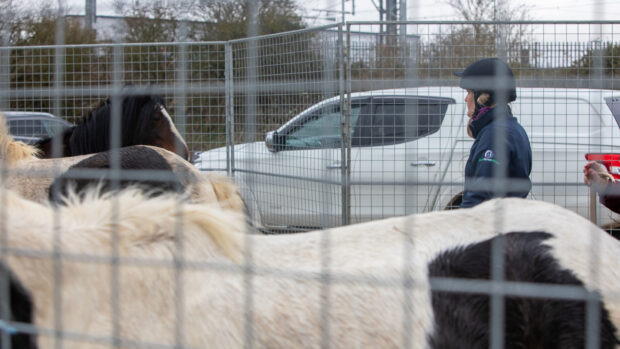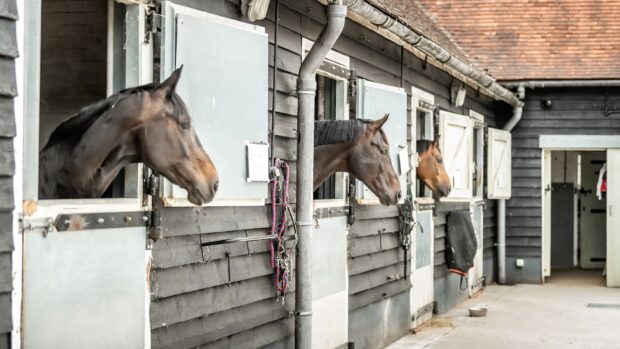Nearly two thirds of the public do not support the involvement of horses in sport as things stand – and we must “be brave” and proactive to ensure equestrianism has a future.
These were key messages from the latest independent survey commissioned by World Horse Welfare to assess public perception of horse sport.
The YouGov research asked the same questions as last year’s survey commissioned by the charity on the same topic, but of more people. There were more than 4,000 responses, representative of the UK population as a whole.
The results showed that, as in 2022, some 60% of the general public are not happy with the status quo. Two in five, 40%, said they would support continued involvement of horses in sport only if their welfare was improved and 20% do not support continued involvement of horses in sport in any circumstances. Just over half, 57% feel it is acceptable for horses to be ridden, 15% disagreed.
The results were revealed at an event run by the charity on 14 June.
“World Horse Welfare believes these conversations are vital, as they will play a part in determining the future of equestrian sport,” said the charity’s CEO Roly Owers. “We support ethical and responsible involvement of horses in sport, and we know good welfare and horse sport are not mutually exclusive. But we recognise that all in equestrianism need to demonstrate this more, with actions as well as words, to maintain public support.”
Mr Owers said one thing that has changed since last year’s survey is how media coverage has affected people’s confidence in horse welfare in sport.
The results showed that those who interacted regularly with horses said recent media coverage made them feel more confident welfare is protected in horse sport; 37%, compared with 14% of those who do not interact with horses. Of those who do not interact with horses regularly, 25% were slightly or much less confident.
Mr Owers said the survey was conducted in May, so coverage of Grand National protesters may have influenced this, but “this shows media coverage can change views”.
He added that, unsurprisingly, equestrians who responded to the survey were more likely to support involvement of horses in sport, and “we should be wary of the bubble, of how we in the horse world view horse welfare” – more equestrians were happy with the status quo than others, but it is the others who need to be convinced.
Showjumper William Whitaker gave a presentation on how he has changed the status quo to benefit horse welfare. He spoke of a nine-year-old who had had some anxiety issues in the stable, and for whom he sought the advice of an equine behaviourist. Under her guidance, which was backed by research, he tried different stabling options, settling on a pen with a shared hay feeder, so the horse could have physical contact with his neighbour.
“He was much better, and that got the cogs turning about the other horses,” William said, adding that he has built large pens to allow turnout even when the fields are waterlogged.
“Do you ever stop learning with horses? Absolutely not. We want to be improving all the time, in everything we do, and the health and welfare of the horses is the top priority.”
A panel discussion followed, chaired by former H&H editor Lucy Higginson, with Olympic eventer Sam Griffths, British Horseracing Authority CEO Julie Harrington, racing presenter Rishi Persad, European Equestrian Federation president Theo Ploegmakers and equine vet Merry Smith.
Ms Higginson pointed out the extent of licensing and regulation in racing, compared to other horse sports, and asked if the industry’s work on social licence is paying off.
Ms Harrington said: “Licensing and regulation should be seen as a good thing in terms of confidence in what’s happening at home in our sport, not just on the field of play.”
She added that she believes the work carried out on ensuring a good life for thoroughbreds from birth to death, and communication of this, is paying off, but that racing “isn’t resting on our laurels”.
“Can others learn from racing?” she asked. “Absolutely. But we’re keen to learn from other areas of equestrianism, too. We know what happens in an Olympic discipline can alter perception of racing, and vice versa.”
Ms Smith said she believes it would be “fantastic” for every professional yard to need a licence, with set standards and regulation, adding that although the paperwork could be seen as onerous, the positives could be proving to the public how well horses are cared for.
“It could allow staff to feel greater pride, ownership and commitment,” she said. “And maybe help with recruitment, and be more appealing to sponsors. I think there would be benefits for the horse, at all levels. Top horses generally look wonderful, but we have to consider every animal, and make sure we’re championing those that may be less able and worth less, too.”
Mr Ploegmakers, who said the survey results reflect feelings in other countries, said he would support the idea of licensing, adding that equestrianism is one of the few industries largely free of such schemes.
“We can do anything,” he said. “But we have extra responsibility as we’re working with animals who aren’t protected. I would really support this.”
Sam said he was “a little hesitant” about the idea, owing to pressure it could put especially on those struggling to climb the ladder, but that he “wouldn’t be upset” if the FEI, for example, were to have the power to conduct spot checks of riders’ yards.
“I’m sure riders would be comfortable,” he said. “I think there’s a balance between regulation and almost forcing smaller people out of the sport.”
The idea of asking horses to participate in a risk sport was discussed. Improvements to obstacle safety in eventing and racing, and the extensive training for both horses and riders to ensure they are prepared were cited.
Sam added: “I genuinely feel the horses love it. I’ve finished courses and known they have absolutely loved going round.” The key is how to convey this to the public, especially when so few, only 2.3% of the population according to this survey, interact with horses.
“That’s a figure that chimed with me, that so few interact with horses,” Ms Harrington said. “People consume media through social media and if you’re not part of that life, you won’t get the positive stories. How do we break the bubble?”
There are positives, it was agreed. Equestrianism has a huge number of supporters, the conversation about social licence is growing and measures taken include racing’s independent Horse Welfare Board as well as the FEI’s equine ethics and well-being commission.
But Ms Smith warned that it can be easy to have discussions and feel the situation is not so bad: “We need to translate this into actions that will affect horse welfare in a positive way and share the positive stories with people who don’t really understand our industry.”
Ms Smith suggested more yard open days, and school and youth group visits, for example, as well as using the internet and social media to bring in more people.
“We really need to make the magic of horses something that’s for everyone,” she said.
Other measures discussed include defining what a good life for horses is, to help achieve this. Methods such as the ridden horse pain ethogram, a list of equine behaviours that can indicate pain or discomfort, could be used to show that horses are happy and comfortable in work.
You might also be interested in:

*Opinion* Scaremongering clickbait, or a very real threat to the sport we all love?

A positive future for the horse-human partnership — if we all work together

Why social licence matters, with World Horse Welfare | A Horse & Hound Podcast advertising special

Subscribe to Horse & Hound magazine today – and enjoy unlimited website access all year round
Horse & Hound magazine, out every Thursday, is packed with all the latest news and reports, as well as interviews, specials, nostalgia, vet and training advice. Find how you can enjoy the magazine delivered to your door every week, plus options to upgrade your subscription to access our online service that brings you breaking news and reports as well as other benefits.




